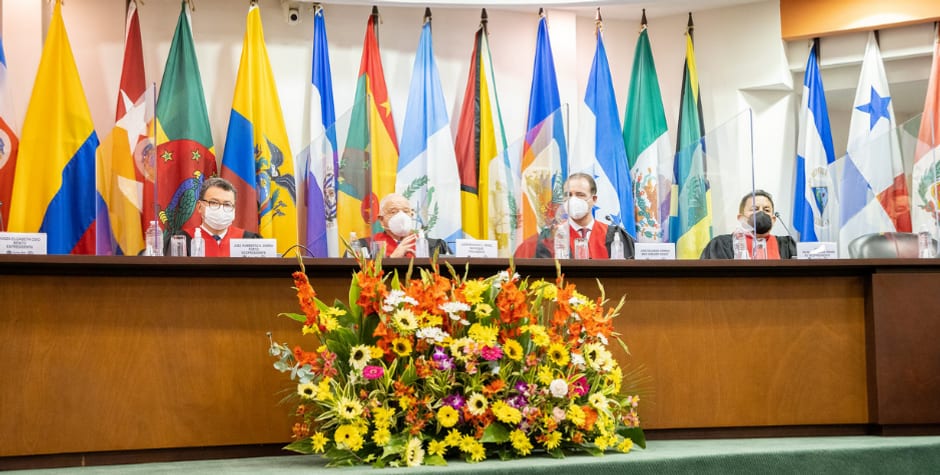

Inter-American Court issues first religious freedom decision, breaking with the ECHR on questions of religious autonomy
IACHR First Religious Freedom Decision
With Tomas Henriquez, Advocacy Director for Latin America and the Caribbean, ADF International.
In the Sandra Pavez v. Chile judgment, the Inter-American Court of Human Rights –the regional human rights court for the Americas– restricted the autonomy of religious institutions to assess and select their religious education teachers, in the context of public schools.
The Pavez v. Chile judgment involved a former Catholic novitiate turned public school Catholic religion teacher, Sandra Pavez. The context involved Chile’s collaborative relationship with religious communities, accommodating confessional religious education of more than a dozen faith communities in all schools, including those administered by the State. The system demands all school to offer religious education, while enrollment remains voluntary for all families. To ensure that religious educators remain faithful to mission, all religious authorities can issue suitability certificates, required for any teacher who wishes to teach a religion class on behalf of a given faith community (i.e.: Catholics, Evangelicals, Muslims, Jews, etc.). In 2007, Pavez’s certificate of approval to teach Catholic religious education was withdrawn by the Church when she refused to give up a public behavior contrary to the Catholic doctrine.
Even though Pavez was not fired from the public school in question, but instead promoted to a leadership position and given a salary raise, she sued the Diocese in domestic courts for discrimination. Given the facts and the national law (Decree 924 of 1983) –which recognizes religious authorities’ right to certify the suitability of religious education teachers without state interference–, her suit was rejected by every court, including the Supreme Court of Chile, finding that the Diocese –who was not its employer– had not acted in an arbitrary or illegal manner in revoking her certificate of suitability.
The case was escalated to the Inter-American Commission. After 14 years through the Inter-American human rights system, a decision was issued by the court in April of 2022 (with a decision reached in February), unanimously holding that Chile had violated Pavez’s right to equality and non-discrimination, her right to privacy and her right to work (with an interesting dissent from judge Sierra Porto on this point), among others.
It is worth noting that there was serious wrongdoing on behalf of two of the judges in this case, Elizabeth Odio (whose conflicts of interest have been explored by ECLJ in the past) and Ricardo Perez Manrique, infringing judicial ethics and requirements of due process by incurring in public statements that disclosed their anti-religious prejudices and predetermined position with regards to the case. Their conduct would have amounted to a human rights violation if incurred by the states.
As reparations to Pavez, the court ordered Chile to pay her standard monetary damages and make public apologies; it also ordered it to reform its national norms to create a concrete appeals procedure that would allow government officials to carry out a “conventionality control” of religious authorities’ assessment of suitability of religious education teachers in the context of public schools. The court also ordered Chile to create “permanent training programs” for those in position to issue certificates of suitability of religious teachers, i.e. religious authorities, to educate them on equality and non-discrimination. The court specifically indicated that these trainings had to include indicators for it to monitor their progress in sensitizing religious authorities on this issue.
The Pavez judgment is conspicuous in its refusal to engage with existing case law of the European Court of Human Rights, as well as relevant UN Human Rights Committee recommendations and the jurisprudence of several States that have dealt with this exact issue. In its decision, the IA Court made a single citation to the case of Fernandez Martinez v. Spain, as support for the minor and undisputed point of the religious community having to show a “probable and serious risk” to religious autonomy to justify its decision. Ironically, the Court failed to acknowledge that such probable and serious risk had been deemed present in the case of Fernández Martínez, in analogous terms to those of the Pavez case, defeating its own suggestion that the facts before the Court were clearly distinguishable. It also notably failed to deal with the fact that the judgment in Fernández Martínez held that Spain was right to protect the Catholic Church’s –and all others– ability to select its own religious education teachers free from state intervention, even in the context of public education.
The Pavez judgment also omitted to mention to the Travas v. Croatia case, where the European Court found no violation of the European Convention where a teacher of Catholic religion in public schools was found unsuitable by the Bishop due to his divorce and remarriage. This precedent was mentioned in the amicus curiae brief filed by Professors Javier Martinez-Torrón and Maria Valero Estrella on behalf of the religious freedoms institutes that they preside, which explained the scope of the European Court of Human Rights holdings on autonomy of religious institutions to hire and fire religious education teachers. It was one of 17 amicus curiae briefs supporting autonomy of churches and religious institutions, including an interreligious amicus by the Catholic, Orthodox, Protestant, Jewish and Muslim representatives from Chile, supporting the state in this lawsuit.
The judgment also attempts to transplant a legal standard copied from American constitutional law in an expanded manner, and ultimately simply fails to apply it. For some time, the Court has taken to applying a broad form of “strict scrutiny”. But unlike in the United States – where the U.S. Supreme Court makes limited use of the strict scrutiny standard for racial classifications and fundamental rights, such as voting, marriage and interstate travel– the Inter-American Court chooses to use it for all cases involving the so-called suspect categories of article 1.1 of the American Convention.[1] We must note that it is not the statute itself which was subject to strict scrutiny (the Court conceded that, on its face, Decree 924 was valid in accordance with the Convention), but rather the decision to unassign Ms. Pavez from teaching the catholic religion class, after the bishop had found her unsuited for the task. While the court supposedly engages in this mode of analysis, which would see it compare the decision to all the elements of the test, the court simply skips them all, jumping to the conclusion of costs outweighing benefits, with no argument offered to support this (par. 144).
Notably, the Pavez judgment seems to have acknowledged, as part of the Inter-American body of law applicable to the States in light of the American Convention on Human Rights, a restrictive version of the U.S. Supreme Court’s “ministerial exception”, articulated in Hosanna-Tabor Lutheran Church and School v. EEOC, which recognizes churches’ autonomy to hire and fire employees who carry out religious functions by barring legal claims against them. While the Inter-American court held that the exception does not apply in the field of public education, where governments cannot “unconditionally delegate” public functions to religious authorities, it conceded that the exception would apply in religious communities and private religious education. Although by itself this restricted scope of church autonomy ought to be rejected, it is nonetheless an interesting and important development in the court’s decision, as it potentially has wide-reaching implications for the future in the region. It is also important to point out that the decision limited itself to the facts of the case, and ultimately resolved the issue purely on an (alleged) proportionality analysis of the supposed restrictions on Ms. Pavez’s rights. Thus, Chile’s Church-state relations or regime remained untouched, with the court specifically acknowledging that the American Convention allows “very different constitutional models regarding Church-state relations” (para. 95), contrary to demands by several amicus curiae briefs that it hold that the teaching of any religion in public schools violates the American Convention.
Likewise, the Court did not find fault with the substance of Chile’s current regulations on religious education. The Commission and representatives for Pavez had argued that the norms themselves were unlawful and requested an order from the Court to strike them down, in a similar manner as in Gomez Murillo v. Costa Rica, for example, where it acted as a supraconstitutional court by invalidating a national supreme court decision and declaring an executive decree as legally valid in domestic law. Finally, a lot of its anti-religious autonomy rhetoric can be found in the judgment’s dicta rather than its ratio, a significant distinction that the court often ignores.
The Pavez judgment stands as a negative precedent in international courts by taking away Church autonomy to independently assess the suitability of religious teachers, even if the restriction would only apply in the public education context. Equally concerning is its order to submit religious authorities to sensitivity trainings in order to re-educate them on purported international human rights standards on the subject. Finally, it constitutes an unprincipled departure from the well settled reasoning by other courts on the same issues: applying nearly identical norms, the Inter-American Court reaches the exact opposite conclusions from the European Court judgments, which on this particular point, have been more protective of religious freedom. It has to be noted that a case very similar to Pavez is pending at the European Court: Ţîmpău and Popa v. Romania.
[1] These categories are explicitly set out in the text, or implicit in it, in accordance with the court (as is the case of sexual orientation, since the Atala v. Chile case).











